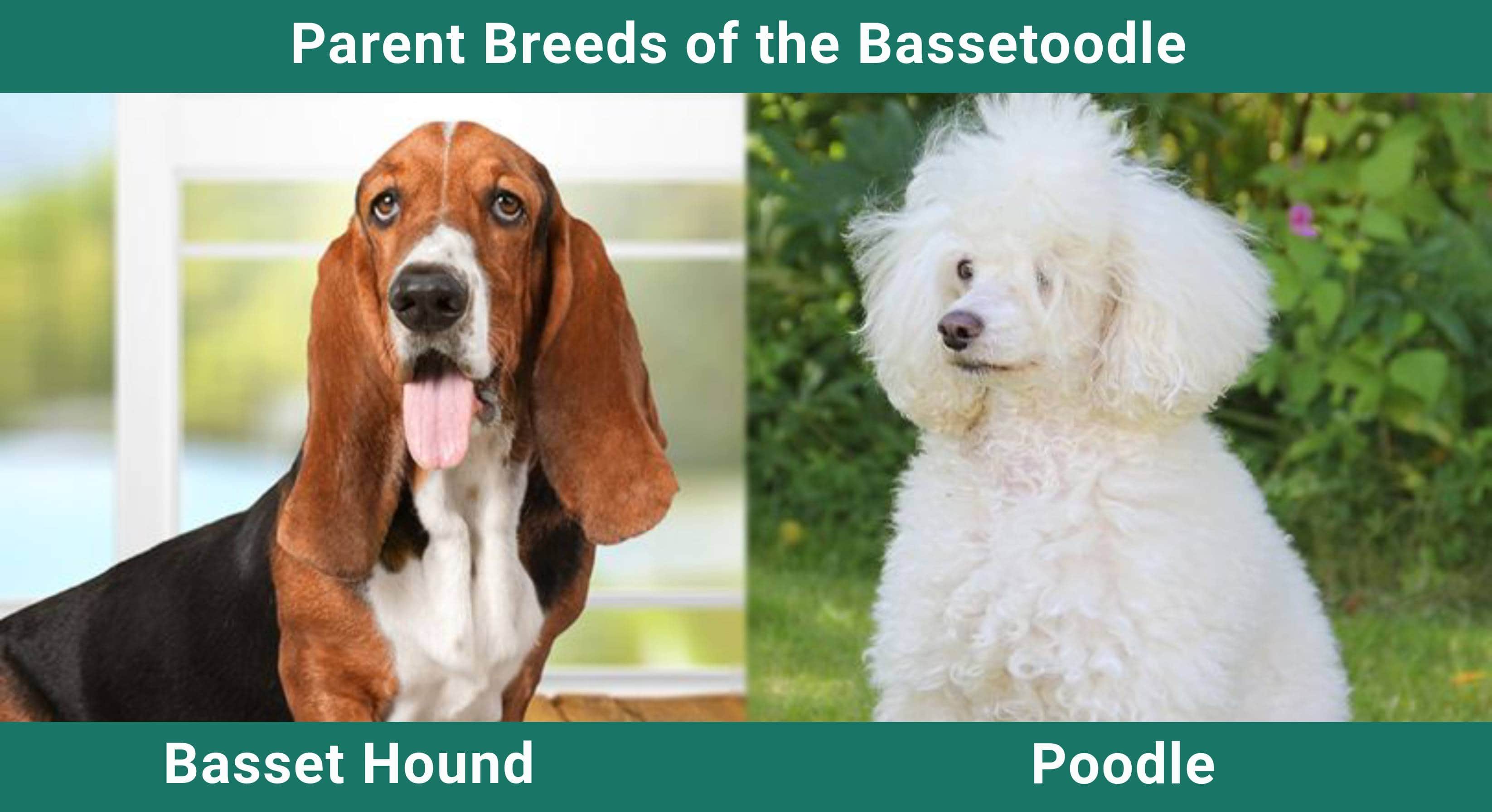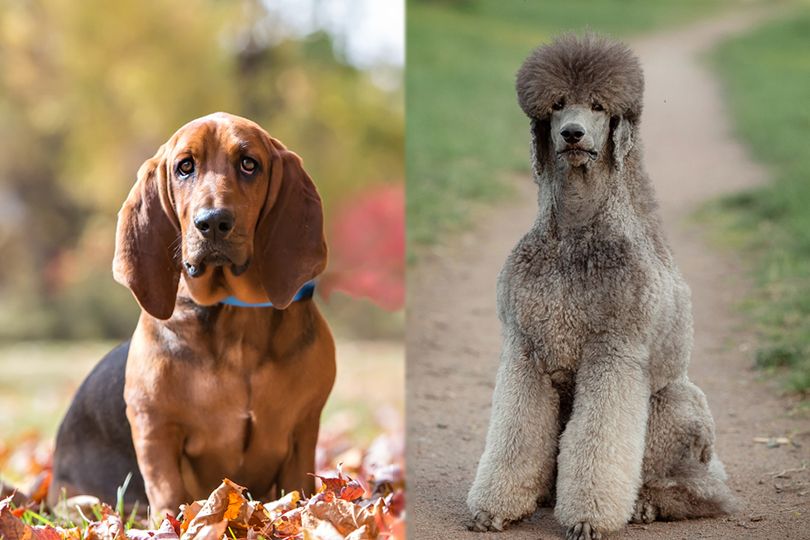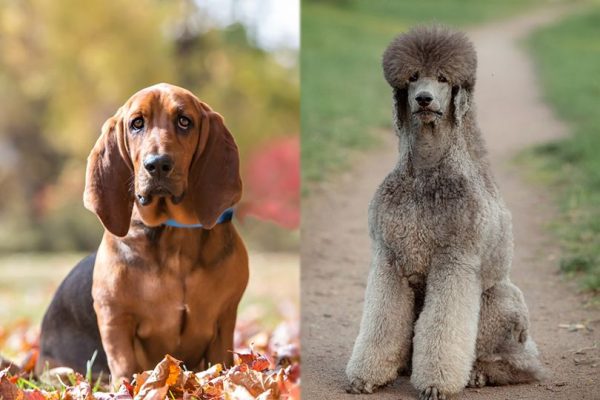Click Below to Skip Ahead
The Bassetoodle is a hybrid breed, a cross between the Basset Hound and the Poodle. These dogs can vary fairly widely in size, as Poodles can come in toy, miniature, and standard sizes, but they are certainly a unique and adorable breed regardless. They are outgoing, friendly dogs that have a great deal of affection to give and love being close to their human companions. However, this means they will suffer from separation anxiety if left alone for long periods.
Breed Overview
Height:
12–16 inches
Weight:
20–30 pounds
Lifespan:
12–15 years
Colors:
Black, white, tan, red, blue, brown, cream
Suitable for:
Apartment living, families, couples
Temperament:
Intelligent, affectionate, playful, loyal, stubborn
If you’re looking for a gentle, sweet-natured companion animal, the Bassetoodle ticks all the boxes. They love to cuddle with their owners on the sofa but are always up for a walk or play session too, making them ideal dogs for families with small children. One thing to keep in mind is that these dogs are immensely curious pooches with powerful noses, and this trait can lead them to wander off with a single-minded focus when on the trail of an interesting scent. This has caused them to have a reputation for being somewhat stubborn, but with good training, these dogs are typically obedient and eager to please their owners.
The Bassetoodle is a rare and fairly new breed, and there is not much information about this unique dog. That’s why we put together this in-depth guide, to help you get to know these adorable dogs better.
Bassetoodle Characteristics

Bassetoodle Puppies
While Bassetoodles are sweet, eager-to-please animals, on the whole, they do have a stubborn streak that can make training a challenge for novice owners. However, with patience, dedication, and the right techniques, they can be successfully trained, and the result is definitely worth it! It’s good to know what you’re getting into before bringing home one of these pooches, though, so you should do your research and prepare for dedicated training sessions.
It’s worth pointing out that these loyal dogs love being close to their owners at all times and are not happy with being left alone for long periods. If you are away at work all day and your Bassetoodle will be at home alone, they are probably not the breed for you. They get along great with other dogs, though, and leaving them at home with a friend will help tremendously.

Temperament & Intelligence of the Bassetoodle
The Bassetoodle is an active dog that will enjoy daily walks and play sessions, but they enjoy their downtime just as much, making them adaptable pooches that can do well in various living environments, including apartments. Basset Hounds are known to be fairly laidback, calm dogs but are accustomed to chasing scents out in the field, and Poodles have also been used as working dogs for centuries. The combination of these two breeds makes for an easy-going pooch that is happy to relax but is also easily excitable and always up for a walk or play session.
Bassetoodles are intelligent dogs that need a great deal of mental stimulation, and without it, they will quickly become bored and possibly destructive. They are not huge barkers but are still vocal dogs that tend to howl frequently, a trait that is exacerbated if they’re not given enough activity or attention. They are not aggressive dogs but are known to be protective of their family and will howl at any suspicious noises or new faces. They are affectionate animals that form strong bonds with their owners, a wonderful trait if you’re with them often but something that can be problematic if you spend long portions of the day away from home. They can quickly suffer from separation anxiety if left alone, and this can lead to howling, digging, and destructive behavior.
While the Bassetoodle is, on the whole, an affectionate and well-behaved pooch, they do have a stubborn and mischievous streak that can be an issue for novice dog owners.
Are These Dogs Good for Families?
Bassetoodles make wonderful family pets. They are abundantly affectionate without being overly needy or overbearing. Although they are happiest when around their human companions, they are also happy to do their own thing—as long as they know that you’re nearby! Their love for playing makes them great to have around children of any age, and they are overall gentle, sweet, and laidback dogs.
They may be small and adorable looking, but they make great little watchdogs because they’re keenly aware of their surroundings and will swiftly howl to let you know if there is anything suspicious around. That said, this howling can become problematic if left unchecked.
Does This Breed Get Along With Other Pets?
With early socialization, the Bassetoodle generally gets on great with other pets. They are friendly animals that are rarely aggressive, and even your family cat will be a welcome friend! Their parent breeds do have a long history of working with hunters, although the instinct is more for tracking than hunting. Smaller pets like rabbits may be seen as prey, but it is easy to train your Bassetoodle to look the other way.
Things to Know When Owning a Bassetoodle
Food & Diet Requirements
Bassetoodles are not overly active dogs but they do love to eat! This makes them prone to getting overweight, so it’s important to keep a close eye on portions and keep the treats to a minimum. Due to how widely these dogs can vary in size, you’ll need to feed your Bassetoodle according to their unique weight and height, but 1 to 2 cups of high-quality kibble split into 2 meals per day is a good rough estimate. Giving them foods that are free from filler ingredients like wheat and soy will also help keep their weight in check, as well as high-quality food that is dense in nutrition. As with all dogs, make sure they have access to fresh, clean water at all times.
Exercise
Bassetoodles love a good walk, run, and play session and are moderately active dogs, but they certainly don’t need as much exercise as their parent breeds. Around 30-60 minutes a day is ideal, with training and play sessions mixed in too. They are usually more than willing to go for a walk or play a game of fetch, but they are also just as happy not to, so you must take the initiative to get them the required exercise to prevent them from getting overweight, as they are unlikely to ask for it! Also, these dogs love tracking scents and smells, so it’s vital to keep them on a leash when going on outings.
Training
With their slightly stubborn and independent streak, Bassetoodles can be a challenge to train for novice owners, so it’s important to begin training early on. They usually love the training process and thrive on the mental challenge of learning commands, but they are easily distracted by scents and noises, and this can swiftly undo all your hard work. To try and overcome this, we recommend engaging in training sessions after a workout, as they’ll be slightly more tired and less prone to outside distractions. We also advise keeping training sessions short, to minimize the chance of them losing interest.
Consistency, patience, and dedication are all key when training a Bassetoodle, and with reward-based training methods and a good dose of patience, they are actually a joy to train.
Grooming ✂️
The grooming needs of your Bassetoodle depend largely on what coat they inherit. Their coat is typically medium-length, often with the tight curls of their Poodle parent. They’ll need regular brushing, at least two to three times a week, to keep their coat from knotting and matting. Alternatively, you can keep their coat shaved short, like many Poodle owners do. They commonly inherit the long, droopy ears of their Basset Hound parent, so you’ll need to keep a close eye out for infections and keep their ears clean and dry at all times. Other than that, keep their nails clipped to prevent injury, and brush their teeth regularly to avoid dental issues.
- See Also: 11 Best Dog Shampoos
Health and Conditions
Bassetoodles are generally healthy pooches due to their hybrid breed genetics, benefiting from “hybrid vigor”. They have few genetic health issues, but like all breeds, they can still suffer from several common health problems.
- Allergies
- Obesity
- Ear infections
- Eye issues
- Hip and elbow dysplasia
- Epilepsy
- Bloat
- Hypothyroidism
Male vs Female
The last decision to make before bringing home your new Bassetoodle pup is whether to get a male or female. Most of your dog’s personality comes from their breed and upbringing and is largely independent of their sex, so we recommend going to view the parents and puppies and make your decision based on their unique character. There is little difference between male and female Bassetoodles other than size; males tend to be slightly larger, but even this is only a minor difference.
We highly recommend spaying or neutering your dog when they reach the appropriate age, as this will further mitigate any hormonal differences and make for a healthier dog overall.

3 Little-Known Facts About the Bassetoodle
1. They are highly intelligent dogs
With one of their parent breeds being the intelligent Poodle—one of the five smartest dogs in the world—your Bassetoodle will inherit some of those smarts too. The Basset Hound is no slouch either, and while they are not known for being hugely clever animals, they are expert scent dogs that have long been used for tracking scents that other breeds could not come close to finding.
2. Their coats can vary widely
The Bassetoodle has parent breeds with distinctly different coats. With the Poodle’s tight, thick curls and the Basset Hound’s short, straight coat, your Bassetoodle’s coat can fall anywhere in between. From long, furry ears with straight muzzles and droopy eyes to short ears and a short coat with fluffy extremities, there is really no way to predict the coat of a Bassetoodle, and this is partly what makes owning one of these dogs so exciting!
3. Bassetoodles are a designer breed
Defined as a cross between two purebred dogs, “designer” breeds have become popular in the last few decades because they inherit all the best aspects of their purebred parents (including adorable looks!) without many of the associated health issues. Due to the Bassetoodle’s designer status, they are not a part of the American Kennel Club’s registry but can be registered with several other registries, including the Designer Breed Registry and the Designer Dogs Kennel Club.
Wrapping Up
The Bassetoodle is a unique, affectionate, intelligent, and laidback pooch overall, and while they are not as well-known as their parent breeds, the combination makes for a wonderful family pet. They are exceedingly loving animals without the problem of being too overbearing, and they are playful but not overly energetic, making them great around children.
Although they can be stubborn at times and somewhat challenging to train, they make up for it with an eager-to-please and loyal attitude. With dedication and patience, they can be taught commands and learn to not run toward every new scent that they pick up. One important aspect of owning a Bassetoodle is that they are social animals that do not enjoy being left at home alone, so if you are away from home often, you may want to consider another breed.
Overall, Bassetoodles are wonderful family pets that are easy to care for, adaptable, affectionate, and loyal as they come!
Related Reads and Breeds:
Featured Image Credit: Left – Victoria Rak, Shutterstock; Right – Valeriya_Chistyakova, Shutterstock









